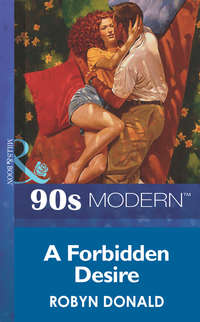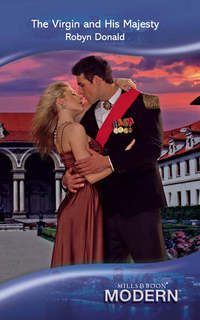
Полная версия
Surrender To Seduction
‘No,’ he said, his smile a thin line edged with mockery. ‘Like you, I have friends with families, and I can claim a couple of godchildren too.’
Although he hadn’t answered her unspoken question, he knew what she’d been asking. If she wanted to find out she was going to have to demand straight out, Are you married?
And she couldn’t do that; Cara’s love life was her own business. However, Gerry wondered whether it might be a good idea to drop a few comments to her about the messiness of relationships with married men.
Apart from anything else, it made for bad publicity, just the sort Cara couldn’t afford at the beginning of her career.
She was glad when the sudden movement of the baby in her arms gave her an excuse to look away. ‘All right, little love,’ she soothed, rocking the child until she settled back into deep sleep.
He said, ‘Your coffee’s finished percolating. Can I pour it for you?’
‘Thank you,’ she said woodenly.
‘My pleasure.’ He got to his feet.
Lord, she thought wildly, he towers! From her perch on the sofa the powerful shoulders and long, lean legs made him a formidable, intimidating figure. Although a good height for a model, Cara had looked tiny beside him.
‘Are you sure you don’t want one?’
‘Quite sure, thanks. Will you be able to drink it while you’re holding the baby?’
What on earth had she been thinking of? ‘I hadn’t—no, I’d better not,’ she said, wondering what was happening to her normally efficient brain.
‘I’ll pour it, anyway. If it’s left too long on a hotplate it stews. I can take the baby back while you drink.’ He spoke pleasantly.
Gerry tried not to watch as he moved easily around her kitchen, but it was impossible to ignore him because he had so much presence, dominating the room. Even when she looked out of the window at the grey and grumpy dawn doing its ineffectual best to banish the darkness, she was acutely aware of Bryn Falconer behind her, his presence overshadowing her thoughts.
‘There.’ He put the coffee mug down on the table before her, lean, strong hands almost a dramatic contrast to its blue and gold and white stripes. ‘Do you take sugar or milk?’
‘Milk, thank you.’
He straightened, looking down at her with gleaming, enigmatic eyes. ‘I’m surprised,’ he said, his voice deliberate yet disturbing. ‘I thought you’d probably drink it black.’
She gave him the smile her cousins called ‘Gerry’s offensive weapon’. Slow, almost sleepy, it sizzled through men’s defences, one of her more excitable friends had told her, like maple syrup melting into pancakes.
Bryn Falconer withstood it without blinking, although his eyes darkened as the pupils dilated. Savagely she thought, So you’re not as unaffected as you pretend to be, and then realised that she was playing with fire—dangerous, frightening, peculiarly fascinating fire.
In a crisp, frosty voice, she said, ‘Stereotyping people can get you into trouble.’
He looked amused and cynical. ‘I must remember that.’
Gerry repressed a flare of anger and said in a languid social tone, ‘I presume you were at the Hendersons’ party last night?’ And was appalled to hear herself; she sounded like a nosy busybody. He’d be quite within his rights to snub her.
He poured milk into her coffee. Gerry drew in a deep, silent breath. It was a cliché to wonder just how hands would feel on your skin, and yet it always happened when you were attracted to someone. How unfair, the advantage a graceful man had over a clumsy one.
And although graceful seemed an odd word to use for a man as big as Bryn Falconer she couldn’t think of a better one. He moved with a precise, assured litheness that pleased the eye and satisfied some inner need for harmony.
‘I met Cara there,’ he said indifferently.
Feeling foolish, because it was none of her business and she knew it, Gerry ploughed on, ‘Cara’s very young.’
‘You sound almost maternal,’ he said, his expression inflexible, ‘but you can’t be more than a few years older than she is.’
‘Nine, actually,’ Gerry returned. ‘And Cara has lived in the country all her life; any sophistication comes from her years at boarding school. Not exactly a good preparation for real life.’
‘She seems mature enough.’
For what? Gerry wondered waspishly. A flaming affair? Hardly; it would take a woman of considerable worldly experience to have an affair with Bryn Falconer and emerge unscathed.
He looked down at the baby, still sleeping peacefully, and asked, ‘Do you want me to take her while you drink your coffee?’
The coffee could go cold and curdle for all she cared; Gerry had no intention of getting close to him again. It was ridiculous to be so strongly aware of a man who not only indulged in one-night stands, but liked women twelve or so years younger than he was. ‘She’ll be all right on the sofa,’ she said, and laid her down, keeping a light hand on the child as she picked up the mug and held it carefully well away from her.
Sitting down opposite them, he leaned back and surveyed Gerry, his wide, hard mouth curled in a taunting little smile.
I don’t like you at all, Bryn Falconer, Gerry thought, sipping her coffee with feigned composure. The bite of the caffeine gave her the impetus to ask sweetly, ‘What sort of things do you import, Mr Falconer?’
‘Anything I can earn a penny on, Ms Dacre,’ he said, mockery shading his dark, equivocal voice. ‘Clothing, machinery, computers.’
‘How interesting.’
One brow went up. ‘I suppose you have great difficulty understanding computers.’
‘What’s to understand?’ she said in her most come-hither tone. ‘I know how to use them, and that’s all that matters.’
‘You did warn me about the disadvantages of stereotyping,’ he murmured, green gaze raking her face. ‘Perhaps I should take more notice of what you say. The face of an angel and a mind like a steel trap. How odd to find you the owner of a model agency.’
‘Part-owner. I have a partner,’ she purred. ‘I like pretty things, and I enjoy pretty people.’ She didn’t intend to tell him that she was already bored with running the agency. She’d enjoyed it enormously while she and Honor McKenzie were setting it up and working desperately to make it a success, but now that they’d made a good name for themselves, and an excellent income, the business had lost its appeal.
As, she admitted rigorously, had everything else she’d ever done.
A thunderous knock on the door woke the baby. Jerking almost off the sofa, she opened her triangular mouth and shrieked. ‘That’s probably the police,’ Gerry said, setting her cup down and scooping the child up comfortingly. ‘Let them in, will you?’ Her voice softened as she rocked the tiny form against her breast. ‘There, darling. don’t cry, don’t cry…’
Bryn got to his feet and walked out, his mouth disciplined into a straight line. Gazing down at the wrathful face of the baby, Gerry thought wistfully that although she didn’t want to get married, it would be rather nice to have a child. She had no illusions—those cousins who’d embarked on marriage and motherhood had warned her that children invariably complicated lives—but she rather suspected that her biological clock was ticking. ‘Shh, shh,’ she murmured. ‘Just wait a moment and I’ll give you some water to drink.’
The baby settled down, reinforcing Gerry’s suspicion that she’d been fed not too long before she’d been found.
Frowning, she listened as Bryn Falconer said firmly from the hall, ‘No, I don’t live here; I’m just passing through.’
Policemen were supposed to have seen it all, but the one who walked in through the kitchen door looked startled and, when his gaze fell on Gerry, thunderstruck.
‘This,’ Bryn said smoothly, green eyes snapping with mockery, ‘is Constable Richards. Constable, this is Geraldine Dacre, the owner of the house, who found the child outside on the lawn.’
‘How do you do?’ Gerry said, smiling. ‘Would you like a cup of coffee?’
‘I—ah, no, thank you, Ms Dacre.’ His collar seemed to be too tight; tugging at it, he said, ‘I was supposed to meet a social worker here.’
‘She—or he—hasn’t arrived yet.’ Bryn Falconer was leaning against the doorpost.
For all the world as though this was his house! Smiling at the policeman again, Gerry said, ‘If you have to wait, you might as well have something to drink—it’s cold out there. Bryn, pour the constable some coffee, would you?’
‘Of course,’ he said, the green flick of his glance branding her skin as he strode behind the breakfast bar.
He hadn’t liked being ordered around. Perhaps, she thought a trifle smugly, in the future he wouldn’t be quite so ready to take over.
What the hell was she thinking? She had no intention of letting Bryn Falconer into her life.
CHAPTER TWO
HASTILY Gerry transferred her attention to the policeman. ‘What do you want to know about the baby?’ she asked. ‘She’s a little girl, and although I’m no expert I don’t think she’s any more than a day old, judging by the umbilical cord.’
He gave her a respectful look and rapidly became professional. ‘Exactly what time did you first see her?’ he said.
So, very aware of the opening and closing of cupboards in her kitchen, Gerry explained how she’d found the child, nodding at the box with its pathetic little pile of damp clothes. The policeman asked pertinent questions and took down her answers, thanking Bryn Falconer when he brought a mug of coffee.
The constable plodded through his cup of coffee and his questions until Cara appeared in the doorway, her sultry face alive with curiosity and interest.
‘Hello,’ she said, and watched with the eye of a connoisseur as the policeman leapt to his feet ‘I’m ready to go,’ she told Bryn, her voice soft and caressing. ‘Bye, Gerry. Have fun.’
Bryn smiled, the crease in his cheek sending an odd frisson straight through Gerry. Go now, she commanded mentally. Right now. And flushed as he looked at her, a hard glint in his eyes.
Fortunately the doorbell pealed again, this time heralding the social worker, a pleasant, middle-aged woman with tired eyes and a knack with babies. Cara and Bryn left as she came in, so Gerry could give all her attention to the newcomer.
‘I’m rather sad to see her go,’ Gerry said, watching as the woman efficiently dressed the baby in well-worn but pretty clothes, then packed her into an official carrycot while the policeman took the box and its contents. ‘For what it’s worth, I think her mother fed her before she put her behind the hedge—she’s not hungry. And she wasn’t very cold when I picked her up, so she hadn’t been there long.’
The social worker nodded. ‘They usually make sure someone will find them soon.’
Gerry picked up her towel and the still dry cashmere jersey. ‘What will happen to the baby?’
‘Now? I’ll get her checked over medically, and take her to a family who’ll foster her until her mother is found.’
‘And if her mother isn’t found?’
The social worker smiled. ‘We’ll do our best for her.’
‘I know,’ Gerry said. ‘I just feel a bit proprietary.’
‘Oh, we all do that.’ The woman gave a tired, cynical smile. ‘When you think we’re geared by evolution to respond to a baby’s cry with extreme discomfort, it’s no wonder. She’ll be all right. It’s the mother I’m worried about. I don’t suppose you’ve seen a pregnant woman looking over the hedge this last couple of weeks, or anything like that?’
‘No, not a glimpse.’
The policeman said, ‘I’d say she’s local, because she put the baby where she was certain she’d be found. She might even have been watching.’
Gerry frowned, trying to recall the scene. ‘I don’t think so. Apart from the traffic, I didn’t see any movement.’
When they’d gone she lifted the cashmere jersey to her face. It smelt, she thought wryly, of newborn baby—that faint, elusive, swiftly fading scent that had probably once had high survival value for the human race. Now it was just another thing, along with the little girl’s heart-shaking fragility and crumpled rose-petal face, to remind Gerry of her empty heart.
‘Oh, do something sensible instead of moping,’ she advised herself crisply, heading for the laundry.
After she’d dealt with the clothes she embarked on a brisk round of necessary housework that didn’t ease her odd flatness. Clouds settled heavily just above the roof, and the house felt chilly. And empty.
Ruthlessly she banished the memory of wide shoulders, narrow masculine hips and a pair of gleaming green eyes, and set to doing the worst thing she could find—clearing out the fridge. When she’d finished she drank a cup of herbal tea before picking up the telephone.
‘Jan?’ she said when she’d got through. ‘How are you?’
‘I’m fine,’ said her favourite cousin, mother of Gerry’s goddaughter, ‘and so are Kear and Gemma, but why aren’t you at work?’
‘How do you know I’m not?’
‘No chaos in the background,’ Jan said succinctly. ‘The agency is mayhem.’
‘Honor persuaded me to take a holiday—she said three years without one was too long. And she was right. I’ve been a bit blasé lately.’
‘I wondered how long you’d last,’ Jan said comfortably. ‘I told Kear a month or so ago that it must be time for you to look around for something new.’
‘Butterfly brain, that’s me.’
‘Don’t be an idiot.’ For a tiny woman Jan could be very robust. ‘You bend your not inconsiderable mental energy to mastering something, and as soon as you’ve done it you find something else. Nothing butterfly about that. Anyway, if I remember correctly it was your soft heart that got you into the modelling business. You left the magazine because you didn’t agree with the way it was going—and you were right; it’s just appalling now, and I refuse to buy it—and Honor needed an anchor after she broke up with that awful man she was living with. Whatever happened to him?’
‘He died of an overdose. He was a drug addict.’
‘What a tragedy,’ Jan sighed. ‘If you’re on the lookout for another job, will you stay in the fashion industry?’
‘It’s a very narrow field,’ Gerry said, wondering why she now yearned for wider horizons. She’d been perfectly happy working in or on the fringes of that world since she’d left university.
‘Well, if you’re stuck you can take over from me.’
‘In which capacity—babysitter, part-time image consultant, or den mother to a pack of wayward girls?’
Several years previously Jan had inherited land from her grandfather in one of Northland’s most beautiful coastal areas, and had set up a camp for girls at risk. After marrying the extremely sexy man next door, she’d settled into her new life as though she’d been born for it.
Jan laughed. ‘The camp is going well,’ she said cheerfully, ‘but I don’t think it’s you. I meant as image consultant. You’d be good at it—you know what style means because you’ve got it right to your bones, and you like people. I’ve had Maria Hastings working for me, but she, wretched woman, has fallen in love with a Frenchman and is going to live in Provence with him! And I’m pregnant again, which forces the issue. I sell, or I retire. I’d rather sell the business to you if you’ve got the money.’
‘Well—congratulations!’ It hurt. Stupid, but it hurt. Jan had everything—an adoring husband, an interesting career, a gorgeous child and now the prospect of another. Quickly, vivaciously, Gerry added, ‘I’ll think about it. If I decide to do it, my share of the agency should be enough to buy you out.’
‘Have you spoken to Honor? Does she mind the thought of you leaving?’
‘No. Apparently she’s got a backer, and she’ll buy my share at a negotiated price.’
‘I don’t want to over-persuade you,’ Jan said quickly. ‘I know you like to develop things for yourself, so don’t feel obliged to think about it. Another woman wants it, and she’ll do just as well. You’re a bit inclined to let the people you like push you around, you know. Too soft-hearted.’
‘You’re not over-persuading.’ Already the initial glow of enthusiasm was evaporating. What would happen when she got tired of being an image consultant? As she would. A shiver of panic threaded through her. Surely that wasn’t to be her life? Her mother had spent her short life searching for something, and had failed spectacularly to find it. Gerry was determined not to do the same.
‘Something wrong?’ Jan asked.
‘Nothing at all, apart from an upsetting start to my day.’ She told her about the abandoned baby, and they discussed it for a while, until Gerry asked, ‘When’s your baby due?’
‘In about seven months. What’s the matter, Gerry?’
‘Nothing. Just—oh, I suppose I do need this holiday. I’ll let you know about the business,’ Gerry said.
‘Do you want to come up and stay with us? We’d love to see you.’
‘It sounds lovely, but no, I think I want to wander a bit.’
Jan’s tone altered. ‘Feeling restless?’
‘Yes,’ she admitted.
‘Don’t worry,’ Jan said in a bracing voice. ‘Even if you don’t buy my business a job will come hopping along saying, Take me, take me. I’m fascinating and fun and you’ll love me. Why don’t you go overseas for a couple of weeks—somewhere nice and warm? I don’t blame you for being out of sorts; I can’t remember when New Zealand’s had such a wet winter.’
‘My mother used to go overseas whenever life got into too tedious a routine,’ Gerry said.
‘You are not like your mother,’ Jan said even more bracingly. ‘She was a spoilt, pampered brat who never grew up. You are a darling.’
‘Thank you for those kind words, but I must have ended up with some of her genes.’
‘You got the face,’ Jan said drily. ‘And the smile—but you didn’t get the belief that everyone owed you a life. According to my mama, Aunt Fliss was spoilt stupid by her father, and she just expected the rest of the world to treat her the way he did. You aren’t like that.’
‘I hope not.’
‘Not a bit. Gerry, I have to go—your goddaughter is yelling from her bedroom, and by the tone of her voice it’s urgent. I’ll ring you tonight and we can really gossip. As for a new job—well, why not think PR? You know everyone there is to know in New Zealand, and you’d be wonderful at it. One flash of that notorious smile and people would be falling over themselves to publicise whatever you want.’
‘Oh, exaggerate away!’ Gerry laughed, but after she’d hung up she stood looking down at the table, tracing the line of the grain with one long finger.
For the last year she’d been fighting a weariness of spirit; it had crept on her so gradually that for months she hadn’t realised what it was. The curse of my life, she thought melodramatically, and rolled her eyes.
But it terrified her; boredom had driven her mother through three unsatisfactory marriages, leaving behind shattered lives and discarded children as she’d searched for the elusive happiness she’d craved. Gerry’s father had never got over his wife’s defection, and Gerry had two half-brothers she hardly ever saw, one in France, one in America—both abandoned, just as she’d been.
She sat down with the newspaper, but a sudden scatter of rain against the window sent her fleeing to bring in the clothes she’d hung on the line an hour before.
A quick glance at the sky told her they weren’t going to get dry outside, so she sorted them into the drier and set it going. Staring at the tumble of clothes behind the glass door, she wondered if perhaps she should go overseas.
Somewhere warm and dry, she thought dourly, heading back to pick up the newspaper from the sofa. The model disporting herself beneath palm trees was one she had worked with several occasions in her time as fashion editor; Gerry was meanly pleased to see that her striking face was at last showing signs of the temper tantrums she habitually engaged in.
‘Serves her right, the trollop,’ she muttered, flicking the pages over before putting the newspaper down.
No, she wouldn’t head overseas. She couldn’t really afford it; she had a mortgage to pay. Perhaps she should try something totally different.
She read the Sits Vac with mounting gloom. Nothing there. Well, she could make a right-angle turn and do another degree. She rooted in a drawer for the catalogue of extension courses at the local university, and began reading it.
But after a short while she put it to one side. She felt tired and grey and over the hill, and she wondered what had happened to the baby. Had she been checked, and was she now in the arms of a foster-mother?
Gerry decided to clean the oven.
It was par for the course when halfway through this most despised of chores the telephone beeped imperatively.
An old friend demanded that Gerry come to lunch with her because she was going through a crisis and needed a clear head to give her advice. Heaving a silent sigh, Gerry said soothingly, ‘Yes, of course I’ll have lunch with you. Would you like to eat here?’
Her hopes were dashed. ‘We’ll go to The Blue Room,’ Troy said militantly. ‘I’ve booked. I’ll pick you up in half an hour.’
‘No, I’ll meet you there,’ Gerry said hastily. Troy was the worst driver she knew.
Coincidences, Gerry reflected gloomily, were scary; you had no defence against them because they sneaked up from behind and hit you over the head. Bryn Falconer was sitting at the next table.
‘And then,’ Troy said, her voice throbbing as it rose from an intense whisper to something ominously close to a screech, ‘he said I’ve let myself go and turned into a cabbage! He was the one who insisted on having kids and insisted I stop work and stay at home with them.’
Fortunately the waiter had taken in the situation and was already heading towards them with a carafe of iced water, a coffee pot and a heaped basket of focaccia bread.
Very fervently Gerry wished that Bryn Falconer had not decided to lunch at this particular restaurant. She was sure she could feel his eyes on her. ‘Troy, you idiot, you’ve been drinking,’ she said softly. ‘And don’t tell me you didn’t drink much—it only takes a mouthful in your case.’
‘I had to, Gerry Mrs Landless—my babysitter—had her thirtieth wedding anniversary party last night. Damon wouldn’t go so she saved me a glass of champagne.’
‘You could have told her that alcohol goes straight to your head. Never mind—have some coffee and bread and you’ll soon be fine, and at least you had the sense to come by taxi.’
Her friend’s lovely face crumpled. ‘Oh, Lord,’ she said bitterly, ‘I’m making a total idiot of myself, and there’s bound to be sh-someone who’ll go racing off to tell Damon.’
Five years previously Gerry had mentally prophesied disaster when her friend, a model with at least six more years of highly profitable work ahead of her, had thrown it all away to marry her merchant banker. Now she said briskly, ‘So, who cares? It’s not the end of the world.’
‘I wish I was like you,’ Troy said earnestly and still too loudly. ‘You have men falling in love with you all the time, and you just smile that fabulous smile and drift on by, breaking hearts without a second thought.’
Acutely aware that Bryn Falconer was sitting close enough to hear those shrill, heartfelt and entirely untrue words, Gerry protested, ‘You make me sound like some sort of femme fatale, and I’m not.’
‘Yes, you are,’ Troy argued, fanning her flushed face with her napkin. ‘Everyone expects femmes fatale to be evil, selfish women, but why should they be? You’re so nice and you never poach, but nobody touches your heart, do they? You don’t even notice when men fall at your feet. Damon calls you “the unassailable Gerry”.’
Gerry glanced up. Bryn Falconer wasn’t even pretending not to listen, and when he caught her eyes he lifted his brows in a cool, mockingly level regard that sent frustration boiling through her.
Hastily Gerry looked back at Troy’s tragic face. Tamping down an unwise and critical assessment of Damon’s character, she said firmly, ‘He doesn’t know me very well. Have some coffee.’









